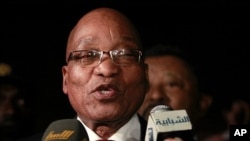South African President Jacob Zuma has ordered an inquiry into a controversial 12-year-old arms deal, intended to modernize the country's military, that has been plagued by charges of corruption and malfeasance almost from its inception. There has been widespread reaction to the announcement.
Twelve years ago this month, Patricia De Lille, then an opposition legislator, alerted parliament in Cape Town to allegations of corruption and malfeasance in the country’s so-called Strategic Defence Procurement Package - now commonly known simply as "the arms deal." She followed with a call for a commission of inquiry into the deal.
Since then, Shabir Shaik, Zuma’s former financial adviser, and one other person have been convicted on charges related to corruption in the arms deal. Between 2005 and 2009 Zuma was also charged with corruption and racketeering in connection with the deal. In 2009 the National Prosecuting Authority, NPA, controversially withdrew the charges on technical grounds - just two weeks before a national vote that led to Mr. Zuma becoming president of the country.
Earlier this year, the NPA director said his office was ending its investigation of the arms deals, despite the earlier convictions and ongoing allegations from Germany, Sweden and the United Kingdom of kickbacks paid in the $4.8 billion contracts.
The president’s sudden decision to launch a probe has prompted widespread reaction - both positive and negative - and also deep puzzlement among many South Africans.
De Lille, currently mayor of Cape Town, says Zuma may have wanted to avoid having the constitutional court order an investigation.
"It seems to be a pre-emptive strike, because by the 15th September the government had to respond to papers in the constitutional court - because there is a constitutional court challenge [by a private citizen] for President Jacob Zuma to establish to the commission of inquiry, so you don’t know whether they were moved by dodging the judiciary and the legal processes, or whether they [are] genuine in this," said De Lille.
Zuma has directed the minister of justice to set up the commission and determine its terms of reference. Like many opposition politicians and legal experts, De Lille is calling for the commission to be headed by someone who inspires confidence in all South Africans.
"I would hope for a retired Constitutional Court judge. I think there are many, many prominent judges in our country that can fulfill that role," she added.
Equally important to many is that the commission be adequately resourced, that the terms of reference are as broad as possible, and that the hearings are held in public. De Lille tells VOA that the commission must also be able to call anyone, including the president, to testify. And she says full access to official records is going to be key to a successful outcome.
"When we [parliament oversight committee] tried to get access to the contracts between South Africa and some of these arms dealers, we were told we cannot have access because there is a confidentiality clause. Now if any commission of inquiry... can’t get access to those so-called confidential contracts, then it is going to be a fruitless exercise," she said.
Also important to many South Africans is whether the commission will be allowed to recommend prosecutions, or if it will be authorized to grant immunity.
Probe of Arms Deal Draws Widespread Reactions in South Africa




